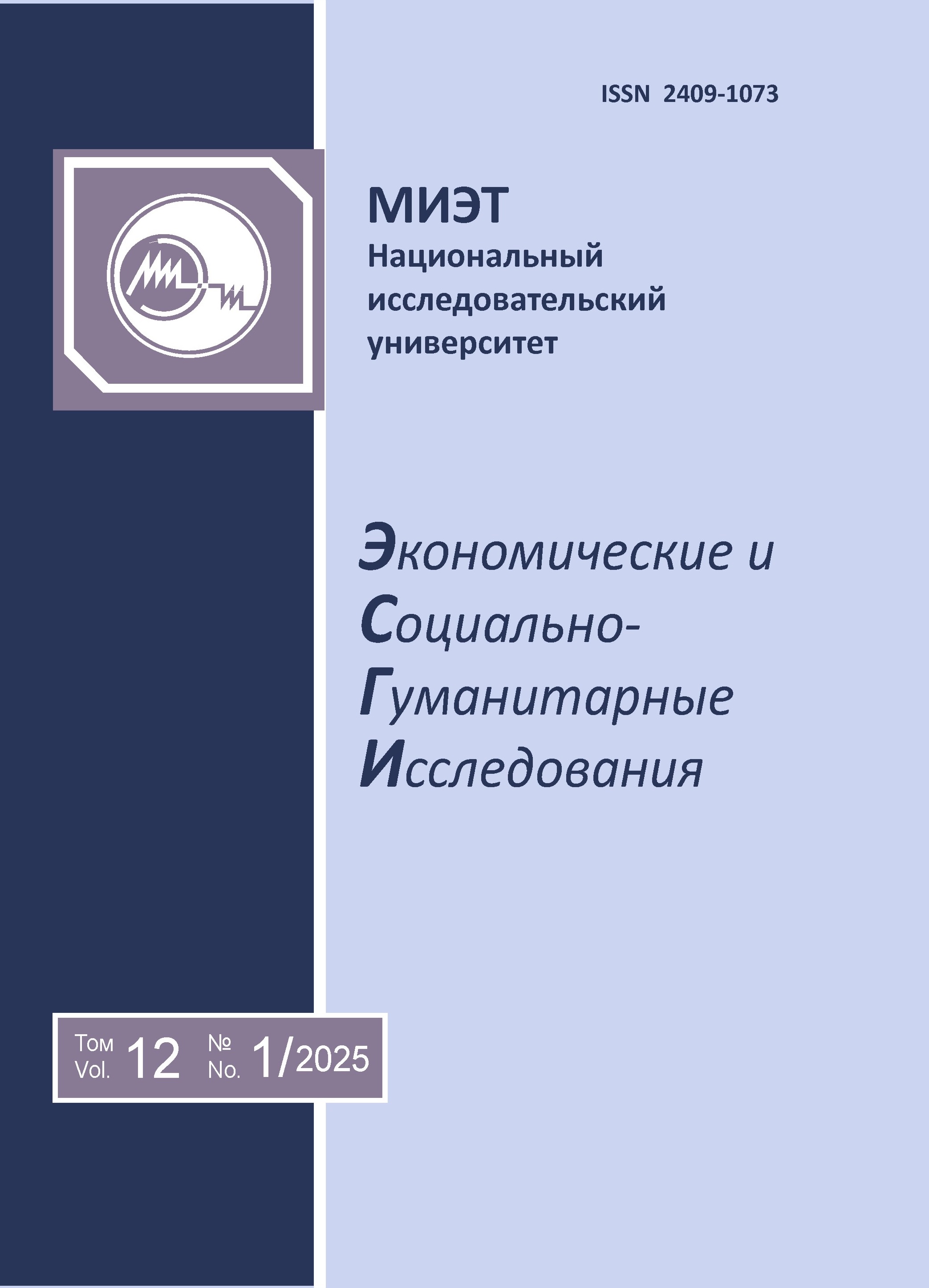employee
Russian Federation
employee from 01.01.2006 to 01.01.2025
UDC 37
UDC 378
The authors consider the problem of developing an online language course for special purposes. An overview of the research areas in online education research is made. The fundamental principles of creating an online course with account for the subject specificity of additional foreign language education are defined. The choice of online education as the most flexible and relevant educational environment in language teaching for special purposes has been substantiated. By method of analyzing the concept volume of an online course the potential of this form of education in application to language learning for special purposes in the conditions of modern digital educational environment has been revealed.
continuing education, additional education, foreign language education, language for special purposes, e-learning, distance learning, online education, online course notion, subject specificity, systematicity
1. Avramenko A. P. “Online-Marathon — a Model to Develop Professional Competence of a Foreign Language Teacher in the Paradigm of Microlearning”. Vestnik RMAT = Vestnik RIAT 3 (2019): 50—57. (In Russian).
2. Gerasimova S. A., Petrosyan V. M. “Additional Education as a Factor of Individualization of Instruction Foreign Language”. Kant 3 (28) (2018): 36—39. (In Russian).
3. Grechushkina N. V. “Online Course: Definition and Classification”. Vysshee obrazovanie v Rossii = Higher Education in Russia 27.6 (2018): 125—134. (In Russian).
4. Dobritsa V. P., Ivanova T. V. “Distance Learning in Higher Education Institutions: Problems and Opportunities”. Vestnik MGPU ser. Informatika i informatizatsiya obrazovaniya = MCU Journal of Informatics and Informatization of Education 2 (56) (2021): 43—48. (In Russian). https://doi.org/10.25688/2072-9014.2021.56.2.05
5. Dobritsa V. P., Ivanova T. V. “Features of Online Course Development”. Vestnik MGPU ser. Informatika i informatizatsiya obrazovaniya = MCU Journal of Informatics and Informatization of Education 1 (59) (2022): 62—66. (In Russian). https://doi.org/10.25688/2072-9014.2022.59.1.07
6. Evdokimova M. G. “Managing Non-Linguistic University Students’ Independent Foreign Language Aquizition in a Digital Environment”. Innovatsionnye tekhnologii v sovremennom obrazovanii: materialy VI Mezhdunar. nauch.-prakt. konf. (Tiraspol’, 29 fevralya 2024 g.): collected papers. Tiraspol: Pridnestrovian State U, 2024. 49—53. (In Russian).
7. Mikhaylova S. V. “Cooperation on The Network: A New Format to Teach Pedagogical Design”. Strategii professional’noy podgotovki uchitelya inostrannykh yazykov v novykh obrazovatel’nykh usloviyakh: materialy IV Vseross. nauch.-prakt. konf. s mezhdunar. uchastiem (Nizhniy Novgorod, 21—22 marta 2023 g.): proceedings. Nizhny Novgorod: Linguistics U of Nizhny Novgorod, 2023. 152—156. (In Russian).
8. Mikhailova S. V., Yungina A. N. “Online Language Marathon in a Social Network as a Gaming Technology”. Inostrannye yazyki v shkole = Foreign Languages at School 6 (2023): 55—61. (In Russian).
9. [Mikhaleva E. I.,] Sushchev S. S. “Using the Flipped Classroom Blended Learning Model to Develop Students’ Phonological Competence”. Inostrannye yazyki v shkole = Foreign Languages at School 1 (2021): 56—62. (In Russian).
10. Petrova N. N., Sidorenko L. P. “Challenges and Prospects of Webinars as Online Learning Method”. Vestnik Chuvashskogo gosudarstvennogo pedagogicheskogo universiteta im. I. Ya. Yakovleva = I. Yakovlev Chuvash State Pedagogical University Bulletin 3 (91) (2016): 134—139. (In Russian).
11. Starichenko B. E., Semenova I. N. “Concerning the Interrelation of E-Learning Concepts in Higher Education”. Obrazovaniye i nauka = Education and Science Journal 9 (118) (2014): 51—68. (In Russian).
12. Sushchev S. S. “Teaching ESP (English for Special Purposes) by Means of Online Course in the Context of Non-Formal Education”. Novye tendentsii lingvodidaktiki: slovo molodym uchenym: collection of articles of Master’s and PhD students. Iss. 2. Moscow: Yazyki Narodov Mira, 2021. 143—147. (In Russian).
13. Sushchev S. S. “Socio-Cultural Prerequisites for Development of Lifetime Education Concept”. Nauchnyy start-2023: collection of articles of PhD and Master’s students. Pt. 1. Moscow: Yazyki Narodov Mira, 2023. 366—371. (In Russian).
14. Fedosov A. Yu., Mnatsakanyan O. L., Eliseeva D. Yu., Eliseeva A. A. “The Russian Market of Online Education for Learning Foreign Languages: Analysis of the Current State and Key Development Trends”. International Journal of Open Information Technologies 11.7 (2023): 137—142. (In Russian).
15. Flerov O. V. “Development of Non-Formal and Informal Teaching of Foreign Languages in the 2010s”. Pedagogika i prosveshchenie = Pedagogy and Education 1 (2022): 126—142. (In Russian). https://doi.org/10.7256/2454-0676.2022.1.35523
16. Flerov O. V. “Essential and Methodological Peculiarities of Teaching Second Foreign Language to Adults”. Mir pedagogiki i psikhologii 9 (62) (2021): 90—102. (In Russian).
17. Yungina A. N., Evdokimova M. G. “Would-Be Foreign Language Teachers’ Readiness to Design Digital Language Education Environment”. Vestnik MGPU ser. Filologiya. Teoriya yazyka. Yazykovoe obrazovanie = MCU Journal of Philology, Theory of Linguistics, Linguistic Education 2 (54) (2024): 178—188. (In Russian). https://doi.org/10.25688/2076-913X.2024.54.2.13
18. Yarmakhov B. B. “Digital Textbook: From a Printed Book to an Adaptive Learning System”. Vestnik MGPU ser. Informatika i informatizatsiya obrazovaniya = MCU Journal of Informatics and Informatization of Education 1 (59) (2022): 82—89. (In Russian). https://doi.org/10.25688/2072-9014.2022.59.1.09
19. Agustina T. “English for Specific Purposes (ESP): An Approach of English Teaching for Non-English Department Students”. Beta: Jurnal Tadris Matematika 7.1 (2014): 37—63.
20. Bates A. W. (Tony). Teaching in a Digital Age: Guidelines for Designing Teaching and Learning. 2nd ed. Vancouver: Tony Bates Associates; BCcampus, 2019. 779 p.
21. Dudley-Evans T., St. John M. J. Developments in English for Specific Purposes: A MultiDisciplinary Approach. Cambridge: Cambridge Up, 1999. 320 p.
22. Hutchinson T., Waters A. English for Specific Purposes: A Learning-Centred Approach. Cambridge: Cambridge Up, 1987. 183 p.
23. Ruiz-Palmero J., Fernández-Lacorte J.-M., Sáncez-Rivas E., Colomo-Magaña E. “The Implementation of Small Private Online Courses (SPOC) as a New Approach to Education”. International Journal of Educational Technology in Higher Education 17 (2020): 27. https://doi.org/10.1186/s41239-020-00206-1








